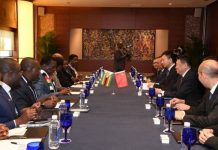I ALWAYS say that winning the workplace must be the first priority so that you can win the marketplace. To be an effective global human resources (HR) leader it is important to comprehend the broad operations and processes that drive commerce and create growth of economies.
HR should make positive contributions to economies, not only to companies. We are living in a world of unceasing change, and it’s important that HR has a place in that. HR’s new role, along with culture and happiness, is future-proofing businesses.
Gaining global experience used to mean accepting an overseas work assignment or taking frequent trips to places abroad.
These days, even HR professionals at companies with no overseas offices, often can claim some global experience in their roles.
Following are the recommendations of the leadership style you need to get the HR global status.
To be a successful human resource leader, it is not only critical to understand the basic principles of business best practices, it is also important to be proactive and strategically develop your leadership style to match the changes in the global world.
HR leaders need global experience. The best HR people come from global backgrounds and leading by example is one way to accomplish this, and it means more than simply walking the talk. It also includes such ideas as integrity, acting and following through.
Think strategically and act accordingly
Leadership involves much more than laying down the law and expecting people to follow. Strategic HR is managing HR in a way that supports the company’s long-term business goals and outcomes.
In essence, you go way beyond the administrative duties HR has been known for and apply HR principles and practices to overall business strategy.
Nowadays, HR professionals are expected to be key partners who help drive their organisation’s overall business strategies.
To do so, HR professionals need to think strategically, connecting a robust HR function with an in-depth knowledge of their organisation’s core business issues and aspiration.
Think global, but act local
With globalisation, increased complexity and risk, especially when it comes to workforce management and implementing practices, HR professionals need to act locally, but thinking globally.
Businesses that expand to new geographies must rethink how they build and manage a cohesive, high-performing workforce that spans cultures, countries and regions. HR people with the skills to manage a global workforce are in high demand as organisations increasingly pursue growth overseas.
Businesses are looking to HR to support this expansion into emerging markets and to attract and grow the talent that will help them capitalise on new opportunities.
Data-driven HR decision-makers
Data-driven decision-making in HR is a leading way for HR practitioners to continually add more value to the business as well as gaining global competency.
Global HR should drive their organisation’s workforce strategy from a combined platform of meaningful data and analytics.
Making use of data analytics will provide critical guidance for all your talent management decisions, reinforcing the relationships among finance, operations, and all business units in your organisation, and deliver the desired business results. Predictive data analytics help HR professionals enhance their hiring and management strategies.
Role modelling and walking the talk
Some of the most positively rated characteristics for global HR leaders is their willingness to “walk the talk,” to be role models and to honour commitments and promises. HR leaders are frequently put into the position of ensuring that others in the organisation do the right thing and follow established procedures.
The leadership must know the exact look of their walk and its precise link to the values of their talk, before they attempt to influence their followers. Additionally, they need to know which behaviour change mechanisms are likely to have the most positive impact on organisation culture/s.
HR as agents of change
Today’s HR leadership is exchanging information and ideas, experiment with work-related technologies and exploring new ways of working.
They are actually leading the effort to create and nurture the organisational culture of innovation, experimentation and open-mindedness that will be needed to drive outcomes in social enterprises.
Taking proactive steps to plan for transition helps overcome obstacles and drive new behaviours, including how intended users perform tasks using workforce management technology.
Change management initiatives are critical for preparing and aligning your global organisation for successful strategy execution.
HR as mentors/coaches
Coaching in the business world is a much more subtle affair, encouraging talents to shine through nurturing and attention. In general, HR leaders are truly concerned about developing others. This sets them apart from leaders in other functions who did not score highly on this skill.
They were also rated positively on providing coaching, acting as a mentor and giving feedback in a helpful way.






